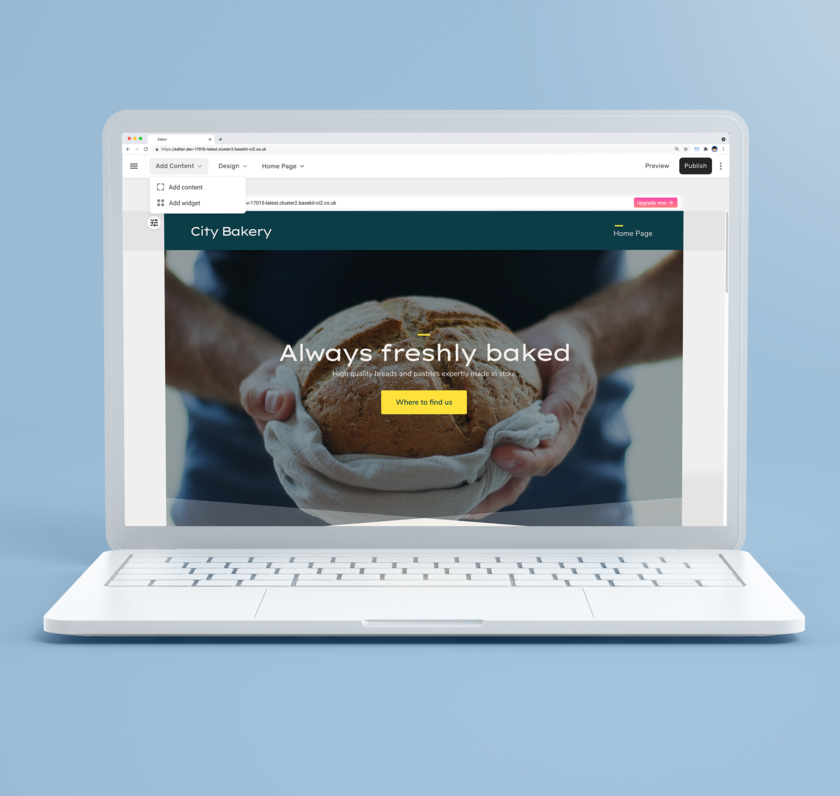Table of Contents
The support for SMBs is stronger than ever
Despite its negative effects, the Covid pandemic has a silver lining. It taught us that with every crisis comes the opportunity to innovate and stay ahead of the curve.
We are witnessing dramatic changes and evolution in many industries; you would first think of IT, of course, and you would be right. However, technologies were just a facilitator that enabled many small and medium businesses to make a 180 degree turn from offline to online channels, mapping themselves in the online world, as the offline was out of reach.
We cannot give this subject a proper wrap up without Simon Best, co-founder and CEO of BaseKit, a Bristol-based software company that builds products to help people create their own unique web presence.
What makes BaseKit stand out is their mission to inspire and guide people to success online and the fact that they not only talk the talk, they walk the walk.
It was a great pleasure to get into details on the subject with Simon in this exclusive interview.
2020 was a challenging year none of us will forget easily. What have been your business highlights (and lowlights) of 2020?
2020 has been a challenging year for everybody and we’re fortunate to have a great team that has been able to adapt quickly to working from home and keeping the business moving forwards.
We have seen an increased demand from small businesses, with many more going online and selling online for the first time. We took the opportunity to improve BaseKit’s e-commerce capabilities with a particular focus on streamlining the onboarding process.
There were many success stories from local businesses that started selling online during the first lockdown and grew to tens of thousands of pounds of sales within weeks. For some, this wouldn’t have been possible offline and the lockdown was what pushed them to take their first steps to success online.

True. Related to that, in one of your blog posts, you explained why starting a business during a recession is a good idea. Do you think that the COVID crises nudged aspiring entrepreneurs towards launching new companies?
Since COVID lockdowns kicked in around the world we’ve seen more business going online for the first time.
Established businesses have been forced to adapt to new COVID restrictions that prevent them from doing business the way they’re used to. In many cases this has actually helped businesses to thrive and grow in ways they might not have considered before.
And for new businesses, many may have come about simply because people had more time to think about and act on their ideas. Perhaps due to being furloughed from their usual work, or working from home and getting back the time spent on commuting.
The support for small businesses has grown stronger than ever in lockdown, with communities rallying around their local suppliers. Many people would prefer to buy from a local business than from the usual global brands, especially when there is a convenient way to buy from them online.
COVID-19 has accelerated digital adoption, creating new opportunities for companies to expand their business online. Service businesses, on the other hand, have had a difficult year. How does your Go Connect App support the companies and people working in the service sector?
There are lots of service businesses that have been able to adapt to provide their services online during the pandemic. We’ve heard from life coaches, fitness instructors, hypnotherapists, teachers, and many more businesses that have continued to serve customers remotely using communication tools like Zoom or Google Meet.
We built Go Connect to simplify workflows for all service businesses, whether they provide services online or offline. Go Connect takes care of scheduling, booking, payment, reminders, and basic customer relationship management. All of these tasks are fiddly and time consuming for small businesses.
We’re launching the Go Connect bookings offering this summer. The long-term vision for Go Connect is to help businesses join up the apps and platforms they already use in a simple way; from social media and IM platforms like Instagram, Facebook, and WhatsApp, to more business-focused apps such as for accounting or marketing.
BaseKit’s e-commerce and website solutions help small businesses to thrive in an ever-changing market. How have your customers’ expectations changed as a result of COVID-19?
The biggest impact has been the huge demand for e-commerce. This has rapidly shifted from a “one day” to a “day one” consideration. This is an example of customers expecting their website to be more functional, and to help them to run their business. In the past, we’d see lots of websites that were simply informational, but now customers expect a website to be central to their business.
Our new Go Connect booking product is our next step in addressing these shifting expectations. If you run a service business then you need your website to work for you, not only attracting customers but also helping them to schedule a time for your service and to pay for it.

In e-commerce and online businesses, technology is at the heart of success. How did BaseKit adapt its technology ecosystem to meet the new demand, and what’s the role of the cloud?
BaseKit is a partner-first company, which means we have always built our technology to serve our large partner brands in the most flexible ways.
We offer two deployment options: hosted SaaS or on-premises. The SaaS model is hosted and managed by the BaseKit team on the AWS or Azure clouds in several locations around the world. The on-premises model enables partners to install and run BaseKit from their own data centres. The BaseKit ops team manages, monitors, and regularly deploys code updates to each installation.
BaseKit partners can each have many hundreds of thousands of websites, so performance and security are always paramount. We have worked with some of the most demanding global brands, and our technology has always been up to the job!
We are almost halfway through 2021 – what trends have you noticed in e-commerce and technology since the beginning of the year?
BaseKit has always been a zero-code product, with customers not needing any technical or design knowledge to get great results. But we‘ve been closely following the recent “no-code” movement, which is essentially a new wave of website and workflow builders that let users do more by joining together data from multiple places. There are lots of ways we can incorporate these new no-code concepts into our products.
